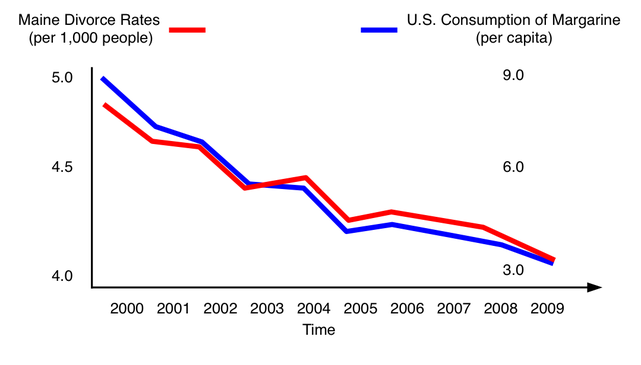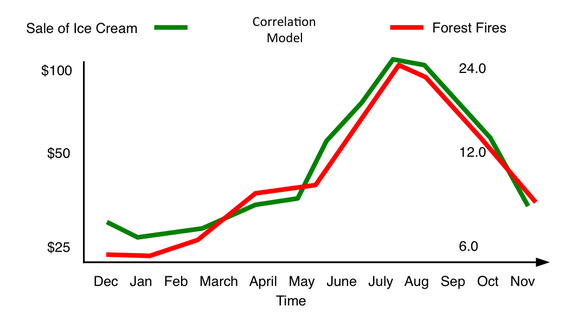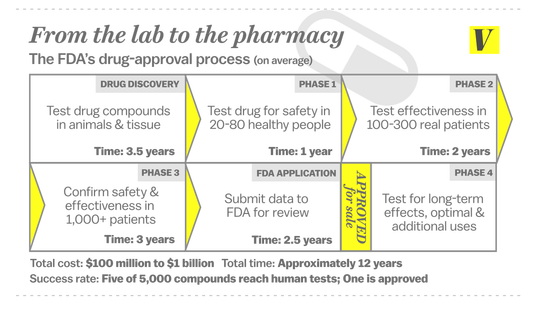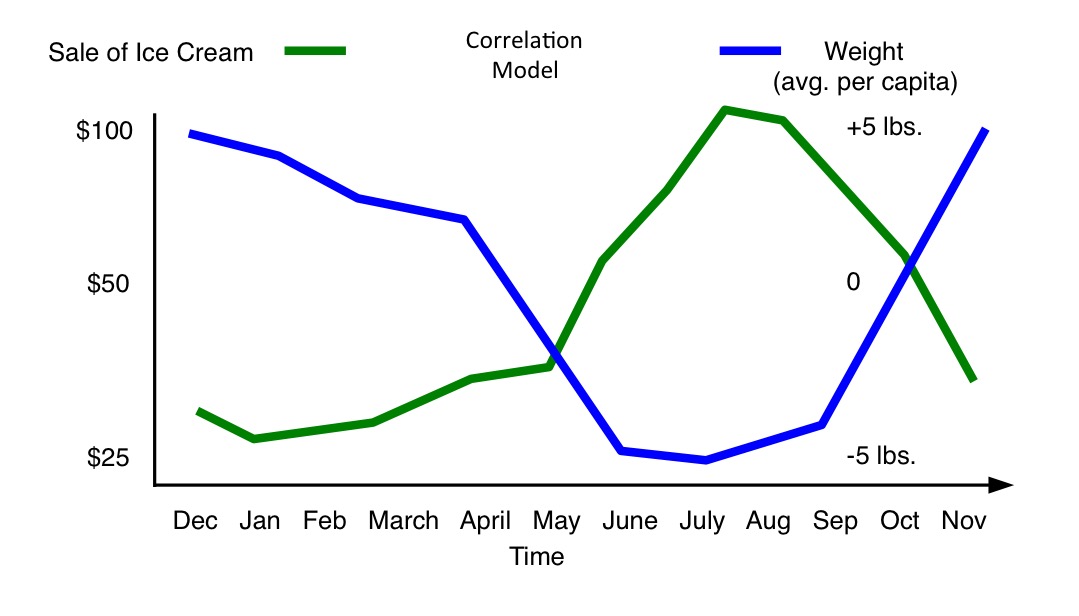|
Like most people I enjoy a tasty scoop of ice cream, especially Oreo blizzards, but what few people realize is how dangerous a treat ice cream has become. First there is the issue of obesity, second there are higher crime rates, third there is the loss of life due to a rise in the number of drowning deaths, and finally, as more ice cream is sold there is an increase in forest fires. Given these indisputable facts, I need you to support my vision of an ice cream free world. While banning ice cream trucks from entering your neighborhood may sound far-fetched, when it comes to problem solving, the above paragraph describes a common issue of misunderstanding the difference between correlation and causation. This misunderstanding can influence our decisions, sometimes with serious consequences that ripple throughout a community. Correlation When two things are related, but one does not cause the other then it is correlation, not causation. Usually this means the two are in some way related to a third factor, but not always. If you have a big enough pile of data, you will even find relationships that are purely coincidence, like the strong relationship between the sale of margarine and divorce in the state of Maine. With the sale of ice cream a third factor is weather. When it is hot outside people buy more ice cream, they are more likely to go for a swim, and there is a general increase in people out and about enjoying the weather, helping improve conditions for crime to take place as well as the dry conditions associated with forest fires. When everyone is snowed in, the trees and grass are wet and it is time for a marathon session of Netflix. To my knowledge no one has yet drowned while watching Netflix, but I guess technically it could happen. A note of caution, there is a growing trend in the digital world called “data dredging”. This is using analytics to sift through mountains of data hoping to find useful relationships. Instead of a problem in search of a solution, dredging data is a solution looking to identify a problem. This does not mean correlations are without value. In fact, correlation is a vital part of helping us move to the next step, the discovery of causation. Causation Unlike correlation, to claim one thing actually causes another thing to happen means you need to be able to demonstrate an actual cause and effect relationship, preferably a strong relationship. Arguably the gold standard of cause and effect is physics, but for an example I will use the pharmaceutical industry. To make the claim that a particular drug causes a certain effect, such as lowering your cholesterol or growing hair, the FDA requires that pharmaceutical companies support those claims, putting the drug through a rigorous, four phase, twelve step process that takes roughly 12 years. The process is strictly regulated using control groups and clinical trials to test the drug, making sure that X causes Y and that the drug is safe (relatively speaking). The acceptable error rate can go as high as 5% for some drugs. This means that the clinical trials prove that there is a 95% chance the drug does actually cause hair to grow. Other drugs are held to an even stricter standard, requiring proof up to 99% effectiveness. Back to ice cream. What about ice cream and obesity? While it may seem like common sense that eating ice cream causes weight gain, the fact is that we don’t yet know the true strength of the relationship. If we look at the sale of ice cream, there is actually an inverse relationship with weight. People gain weight in the winter when sales are low and lose weight in the warm summer months when more ice cream is being consumed. While this suggests ice cream might be the new diet food, knowing about correlation you can avoid drawing a causal conclusion. Instead, recent research on the subject has been looking at different types of sugars used in making a wide range of sweet foods we tend to enjoy. What scientists have discovered is that the hypothalamus, which is an area of the brain that regulates appetite, reacts differently when we consume foods with fructose instead of glucose. This has researchers speculating that eating high fructose foods, such as ice cream, may result in people not feeling full, so they continue to eat. This theory proves difficult however when we start considering apples and other natural fruits also contain fructose, not just ice cream and chocolate cake.
As you can see, causation is difficult to prove, especially the more variables that are involved. No wonder it takes 12 years just to prove a pill causes hair to grow. The Bottom Line Personally, I do suspect that researchers are onto something with this whole fructose thing, but this article is not really about discussing the relationship between ice cream and forest fires or obesity. Instead, I want to reinforce the major difference between correlation and causation. When it comes to your ability to be a better problem solver, understanding this difference is critical. In the real world, away from laboratories and clinical trials, on the news, in boardrooms and coffee shops, everywhere you go, you will hear claims that X causes Y. From politics to the weather, from the stock market to personal relationships it is human nature to try and explain things, to create stories that make sense. As you hear these stories or as you create the story, try to keep in mind one thing, that correlation is not causation. References Huff, D. (1993). How to Lie with Statistics (Reissue ed.). W. W. Norton & Company. Silver, N. (2015). The Signal and the Noise: Why So Many Predictions Fail--but Some Don’t. Penguin Books. Stanovich, K. E. (2012). How to Think Straight About Psychology (10th Edition) (10 ed.). Pearson. Vigen, T. (2015). Spurious Correlations. Hachette Books. About the author: Richard Feenstra is an educational psychologist with a focus on innovation, problem solving and productivity. His work experience includes military service, law enforcement, fire prevention and workplace safety. Richard is also a recognized expert witness regarding issues of safety and security. Richard holds an M.S. in workforce development and a Ph.D. in learning and technology.
1 Comment
|
Authors
Richard Feenstra is an educational psychologist, with a focus on judgment and decision making.
(read more) 
Bobby Hoffman is the author of "Hack Your Motivation" and a professor of educational psychology at the University of Central Florida.
(read more) Archives
April 2023
Categories |




 RSS Feed
RSS Feed
